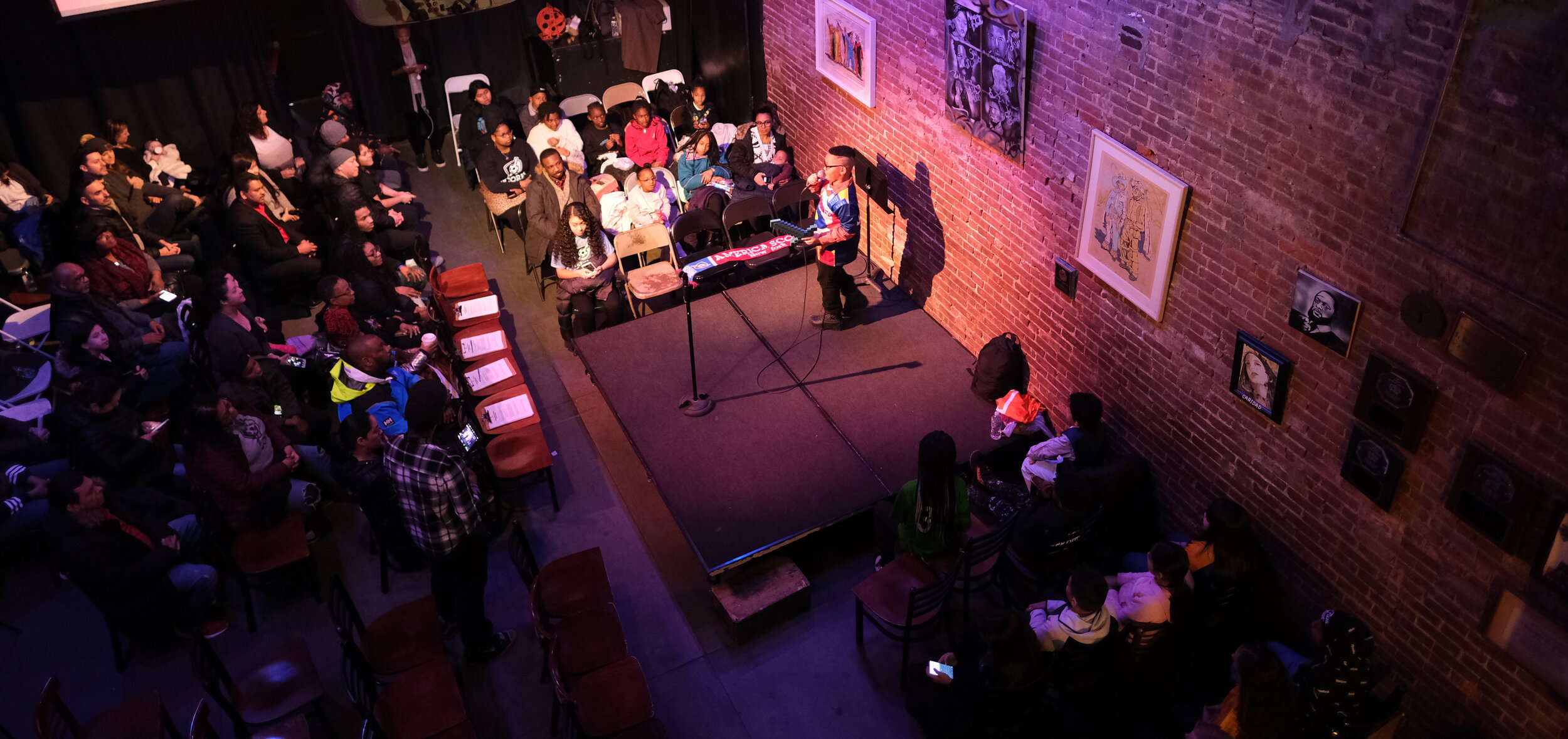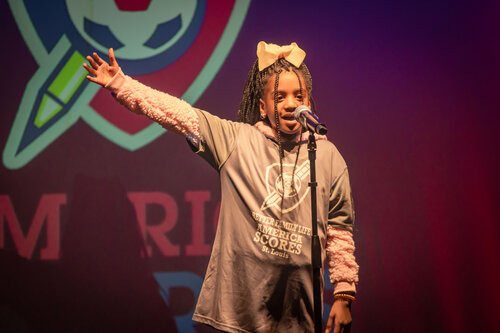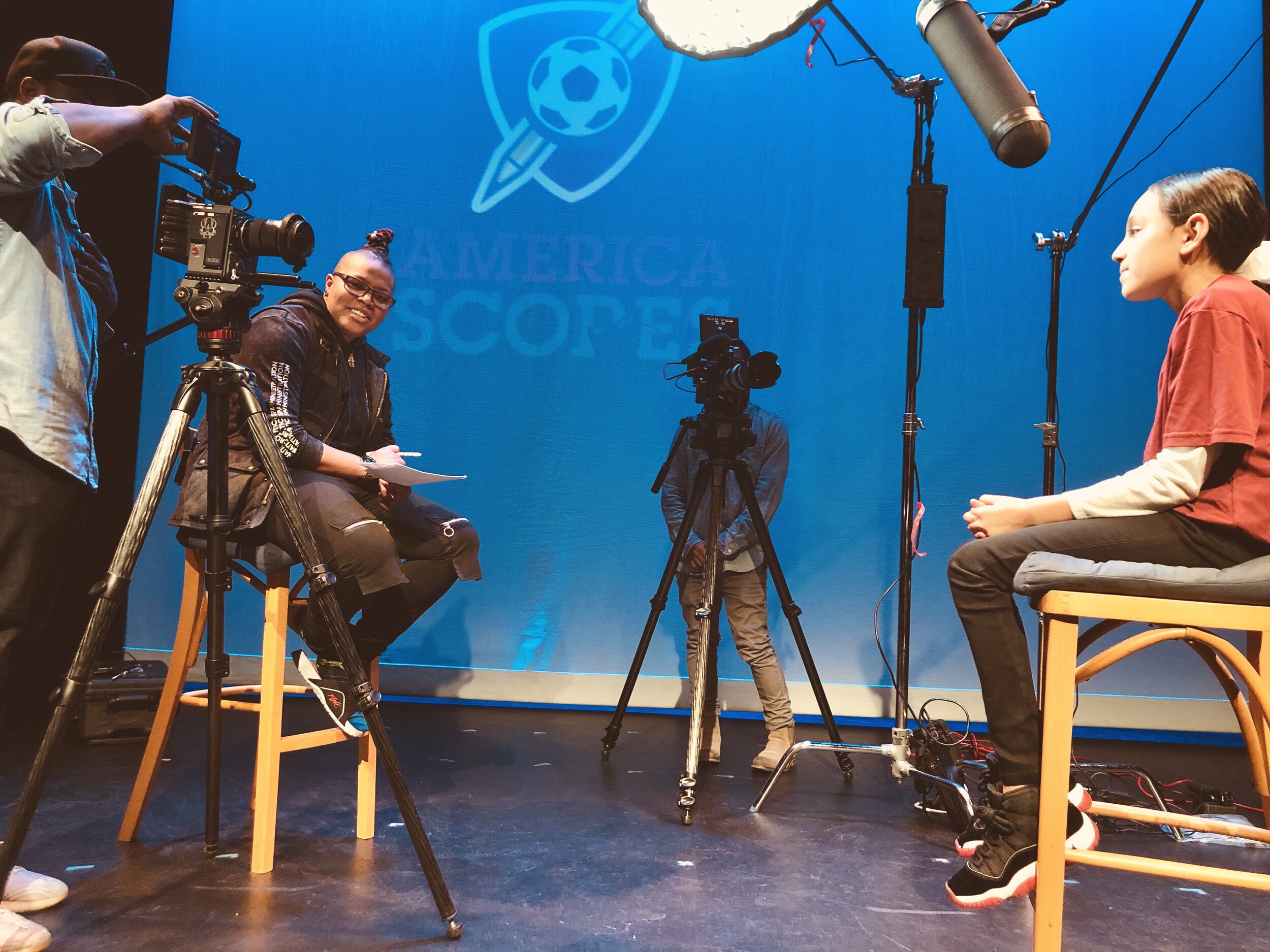
America SCORES Premieres Poetry Slam Documentary
January 29, 2021
Beyond Sport Network member America SCORES supports and inspires urban youth from under-resourced communities to lead healthy physical lives, fully engage in their education and be confident in their ability to make a difference in the world. Using a unique combination of sport and art, they serve over 13,000 students at 311 public and charter schools in 12 major cities in the US. America SCORES New York were one of the 2020 Sport for Reduced Racial Inequalities Collective Impact Award winners supported by The DICK'S Sporting Goods Foundation for their Literacy in Action program.
The "Power of Poetry" is one of the components of the youth-led Literacy in Action program, which works to build a strong social-emotional learning foundation for students and goes a step further to promote social justice and racial equity. The free after-school program consists of soccer, creative self-expression through poetry and service-learning by writing for the community.
America SCORES recently premiered their poetry slam documentary, Our Words Our Cities, which will debut in February on Amazon Prime. We spoke to Bethany Henderson, CEO of DC SCORES and Michael Holstein, Executive Producer of the documentary and Director of Communications and Marketing at DC SCORES, to learn about how the documentary came about and what challenges they were met with during the pandemic.
The documentary contextualises America SCORES's students poetry and spoken word within the history of the art form, allowing them to connect to something far bigger than themselves. Bethany explains that the kids had to conquer a lot of odds to have the confidence to perform in school, let alone to share their stories so passionately with a wider audience. In the film, the poet-athletes talk about their life experiences through their poetry and why having the outlet matters so much to them.
On January 14, a sneak preview of Our Words was held to great success in spite of constraints posed by the coronavirus pandemic. Children were sent popcorn and a printed out ticket that they could frame to bring the “red carpet to the kids.” It was a chance for the children in the program and documentary to see themselves on a big screen, see that their words matter and see that people listen.
“The kids loved it! The opportunity to share their words and their experiences is just life-changing for these 10- and 11-year-olds. This form of expression is really powerful because it is words, it is descriptive and the power of what words can do has a tremendous impact,” said Bethany.

As the world and children of the program watched Amanda Gorman, National Youth Poet Laureate and activist, on stage at US President Biden’s inauguration on January 20, Bethany explained its significance and impact: “Everyone who saw it came to us and said it reminded them of what we did. It really was amazing to see. The power and the connection for our kids to look at her and think that’s someone who looks like me, there's someone I can identify with, there's someone out there doing my craft on this stage and the whole world is listening.”
At America SCORES, the fluidity of soccer and poetry - and the fact that both are universally accessible - were harnessed to create a model for participants. Every child in their Literacy in Action program writes poetry and performs spoken word with their soccer team, acheiving poet-athlete status. They are able to create strong bonds of trust with their team, coaches and themselves. They also design and carry out service projects, taking the issues talked about in their poetry and turning them into action.
Bethany explained that the opportunity for the documentary arose when they thought about how to get their participants on to a bigger stage. After seeing Michael’s 2019 film Soccer in the City that featured America SCORES and highlighted the soccer aspect of their program beautifully, they wanted to showcase the poetry side of the program, “and what better way than through our slams,” she said.
“The genesis of the documentary was the combination of how do we give the kids a bigger stage and at the same time create opportunities for the kids to make more in-depth unique spoken word experiences. And we were thankful to be able to secure funding from the Gannett Foundation and the DC Office of Cable Television, Film, Music & Entertainment.”
"Many of the children that feature in the film are immigrants to the US, who didn’t speak English when they first came here at 4-7 years old. Now, at the age of 10-12 they’re taking part in these poetry slams in their communities. The most inspiring stories for me are the kids who use their poetry to articulate what they’ve overcome in their short lives, what they see and their perspective on what they’ve experienced,” said Bethany.

Typically, the organization holds a The National Slam Series from August through December, culminating in multi-city-youth poetry slams in a dozen cities across the US. The winners of these slams are then invited to Regional Slams. They filmed three Regional Slams in January and February last year. The penultimate National Slam was to take place in Washington DC at the end of March 2020, but wasn't possible due to the pandemic.
“We were two weeks out from flying every child to compete in this National Slam in the historic Kennedy Centre and that didn’t happen, so we didn’t know what to do. We had these national finalists and made the decision to take the entire slam online and that was so challenging,” said Bethany.
The virtual National Slam consisted of posting videos of all the finalist performances, five professional spoken word artists who were the judges and finally an online Zoom awards ceremony. The children were also sent finalists kits with a t-shirt, poetry books and journals to write in, along with a celebratory balloon bouquet.
The pandemic took a toll on the filming of Our Words Our Cities explains Michael, and in the documentary, they address the change in footage. “The centerpiece of the movie was going to be at the Kennedy Centre, this big national event. Losing that opportunity definitely threw a hurdle into the filming. We didn’t even know what we could do technically, let alone creatively or artistically. We have two-thirds of a movie that are beautifully shot and one-third that’s Zoom.”
One child that stood out for Michael was a boy who features in the film along with his father, Ahmed. “Here’s a kid who came over here under dire circumstances, didn't speak English, learned it and mastered it to a point where he can perform it. He gets thrown this crazy once in a lifetime event that pulls him out of school and he can't meet his friends, but he’s still handling it all so gracefully. It is incredibly inspiring!”